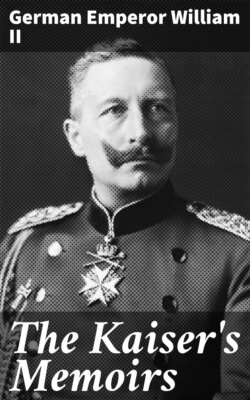Читать книгу The Kaiser's Memoirs - German Emperor William II - Страница 10
На сайте Литреса книга снята с продажи.
TO OFFER DARDANELLES TO RUSSIA
ОглавлениеTable of Contents
In 1886, at the end of August and beginning of September, after the last meeting at Gastein of Emperor William the Great and Prince Bismarck with Emperor Franz Josef, where I also was present at the command of my grandfather, I was commissioned to report personally to Tsar Alexander II concerning the decisions made there and to take up with him the questions relating to the Mediterranean and Turkey. Prince Bismarck gave me his instructions, sanctioned by Emperor William; they dealt most especially with Russia's desire to reach Constantinople, to which the Prince meant to raise no obstacles. On the contrary, I received direct instructions to offer Russia Constantinople and the Dardanelles (in other words, San Stefano and the Berlin Treaty had been dropped!). There was a plan to persuade Turkey in a friendly way that an understanding with Russia was desirable for her also.
The Tsar received me cordially at Brest-Litovsk and I was present there at reviews of troops and fortress and defensive maneuvers, which, even then, unquestionably bore an anti-German look.
To sum up my conversations with the Tsar, the following remark by him is of importance: "If I wish to have Constantinople, I shall take it whenever I feel like it, without need of permission or approval from Prince Bismarck." After this rude refusal of the Bismarck offer of Constantinople, I looked upon my mission as a failure and made my report to the Prince accordingly.
When the Prince decided to make his offer to the Tsar, he must have altered his political conceptions which had led to San Stefano and the Congress of Berlin; or else, on account of the development of the general political situation in Europe, he considered that the moment had come for shuffling the political cards in another way or, as my grandfather had put it, to "juggle" differently. Only a man of the world importance and diplomatic ability of Prince Bismarck could embark on such a course. Whether the Prince had planned his big political game with Russia in such a way that he might, first, by means of the Congress of Berlin, prevent a general war and cajole England, and then, after having thus hindered Russia's Eastern aspirations, cater to these aspirations later, by a stroke of genius, in an even more striking manner, it is impossible for me to say—Prince Bismarck never told anyone about his great political projects.
If the above is true, Bismarck, trusting absolutely to his statesmanlike skill, must have reckoned upon bringing Germany all the more into Russian favor because Russian aspirations were brought to fulfillment by Germany alone—and that at a moment when the general European political situation was less strained than in 1877–78. In this case, nobody except Prince Bismarck could have played the tremendous game to a successful end. And therein lies the weakness in the superiority of great men. Had he also informed England of his offer to the Tsar? England must have been opposed to it, as in 1878.
In any event, the Prince now adopted the policy which I had already noted when I realized the disillusion of the Russians at having stood before the gates of Constantinople without being allowed to enter.
